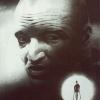Ah, this is correct. I am a perfectionist and stickler for detail. If there is any sort of difference from the aforementioned films, any trace of digital, why even bother?
Most people are travelling in the opposite direction because they not only live in a society of but are themselves cosmopolitan capitalists. Film is the holywood agenda. To woo over the largest quantity, to bring riches, sex, applauds from the herd. The palette of these people are, 'cutting edge technology' 'effects' and 'realism'.
Tarkovsky seemed rather to see film as a medium to portray a very wholesome view of the individual, apart from an 'industry's demands'. He slowed down life itself, to a point where he could capture all auras, colors, and poetic moments in between the hustle and bustle of an organized world. Direct access. Yes, he explores his surroundings, taps into their frequencies--and yet, aside from the surroundings, with the medium of film and its appearance, portrays a poetic vision of life.
As much as I am influenced by Tarkovsky, who to me is the king of form, I would like to start my own form and design, going far beyond that realm.
A cheaper film camera like a Bolex seems ideal, as to start, one is simply testing the waters, and finding out about light, visuals, environment and all the other technical details.
I am located in Victoria, British Columbia, Canada. No idea about access as the journey has just begun. The city holds 300,000 people. Perhaps Vancouver is a more plausible location?
The Mirror, Nostalghia, and Stalker are currently the end-point of cinema.
Cheers.






